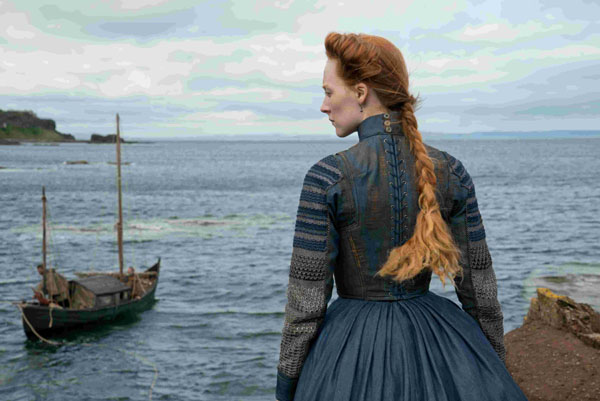
The quick summary on IMDb for the new historical bio-drama Mary Queen of Scots reads “Mary Stuart’s attempt to overthrow her cousin Elizabeth I, Queen of England, finds her condemned to years of imprisonment before facing execution.” Like many aspects of human interpretation—especially of events that occurred almost 500 years ago—this meager sentence is both true and completely off the mark.
Mary Queen of Scots is about power, and the difficulty and danger of wielding and keeping it. Saoirse (rhymes with inertia) Ronan inhabits the title role, a young and beautiful Queen married off to a French monarch and widowed, only to return to Scotland to attempt to rule her native home. Mary claims to have true birthright to the English throne, currently occupied by the equally beautiful, if power-hardened, Queen Elizabeth (Margot Robbie). Despite IMDb’s oversimplification, the film follows the many correspondences between the two cousin queens as they dispute over the line of succession, who should marry and to whom (Elizabeth refuses, while Mary’s heir would have an indisputable claim to the throne), the Catholic/Protestant question (Elizabeth is the daughter of Henry VIII, who divorced England from the Pope so he could divorce his first wife), all while both queens endure the constant squawking of their royal councils, urging both women on what to do, and growing petulant when they do not heed their self-interested advice.
Both women are shrewd strategists, but Mary exhibits all the qualities of a fair and just ruler, which is her ultimate downfall. Ronan imbues Mary with admirable cunning and also caring in the face of her conniving council and spineless spouse. Robbie as Elizabeth is given less screen time, the specter of power looming over Scotland in the midst of a coup, evoking the same mystery of her white-faced paintings, but Robbie still allows through in Elizabeth whatever humanity hasn’t been crushed under the weight of the throne, a weight made all the heavier by the men at her side who can’t stand to have a woman in power (David Tennant appears behind a giant beard as a vitriol-spewing Protestant minister in his most despicable role since Barty Crouch Jr.).
With a screenplay adapted by a writer on House of Cards, Mary Queen of Scots has the feel of a political thriller, but with impending dread replacing conspiratorial intrigue. First-time director Josie Rourke brings her talents as a theater artistic director to Queen Elizabeth’s opulence. She has an eye for grandeur, be it in the Scottish highlands or the English royal court, but she also shows a deep understanding—as I’m sure most women do—for the sacrifices these women must make in order to keep their supposedly God-given power from the hands of petty men, and the price one might pay for refusing to make those sacrifices.













